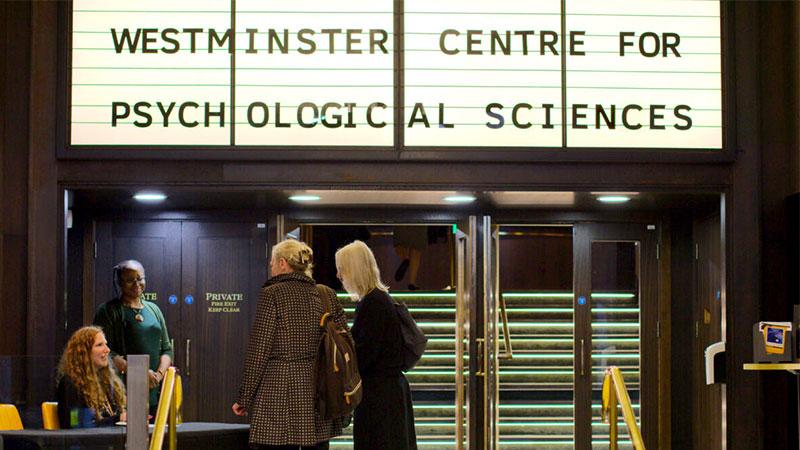Celebrating the expertise and impact made by Psychology academics at the University, the University of Westminster has now officially launched the Westminster Centre for Psychological Sciences in an upbeat event in the University’s historic Regent Street Cinema.

The new research centre aims to lead the way in Psychological Sciences through impactful research and educating students and the wider public.
The launch event was kicked off by Professor Dibyesh Anand, Deputy Vice-Chancellor for Employability and Global Engagement, followed by Director of the Westminster Centre for Psychological Sciences Dr Tina Cartwright introducing the wide-ranging impactful research carried out in the Centre, including projects around suicide prevention by Dr Jay-Marie Mackenzie and memory loss by Professor Catherine Loveday.
Alumna Dr Sian Williams then shared her journey from BBC journalist to practising counselling psychologist following her Master’s degree from the University of Westminster, drawing parallels between journalism and psychology both being about storytelling.
Next up was Professor Catherine Loveday who gave a whistle stop tour of the five research themes in the Westminster Centre of Psychological Sciences. Health, Wellbeing and Stress covers, for example, the role of cortisol in stress and health, motion sickness, and supporting those with chronic conditions such as cancer and long COVID. A second theme, Learning and Development includes research about the development of values and educational attainment in secondary schools. The theme Brain, Cognition and Perception explores decision-making, cognitive performance and dyslexia, to name but a few. Identity, Self and Society is researching topics around fake news, experiences of minoritised people and the psychology of climate change, among others. Finally, Forensic and Investigative Psychology is looking at, for example, eyewitness memory and intelligence gathering.
Some leading researchers of the Centre then took to the stage introducing their work in more depth, including Dr Alison Eardley, Professor Damien Ridge, Professor Coral Dando, Professor Tom Buchanan, and Dr Tom Nadarzynsky. They talked about their research on promoting inclusion in museums, using chatbots to collect eye-witness testimony or provide health information and support, human biases shaping both healthcare and the sharing of misinformation, and how human and digital interfaces can promote inclusion, build empathy and improve rapport.
Also among the speakers was health leader Dr Michael Dixon OBE who joined the sell-out event to talk about how his work with the University of Westminster had led to social prescribing being taken up in the NHS.
Attendees could then ask questions from the panel before University of Westminster Vice Chancellor and President Professor Peter Bonfield’s closing remarks praising the Centre’s academics for the difference they are making in the real world. Attendees were then treated to a lively reception to network and discuss the research and impact of the new Westminster Centre for Psychological Sciences further.
Tina Cartwright, Director of the new Westminster Centre for Psychological Sciences, said: “The launch event was a wonderful opportunity to celebrate the broad scope and impact of our research in contributing to a more equitable, compassionate and healthier society. We heard about the ways in which researchers are using creative approaches to engage with communities to re-think access and inclusion across different sectors, for example in museums, education, healthcare and criminal justice settings. We are so pleased that we received very positive feedback from our audience.”
The attendees found the event “inspiring and thought-provoking”, and they also said it was “reassuring that there are professionals taking such a deep interest in wellbeing and humanity.”
Learn more about the new Westminster Centre for Psychological Sciences.
Find out more about Psychology courses at the University of Westminster.
Credit: Photos by Dr David Williams







